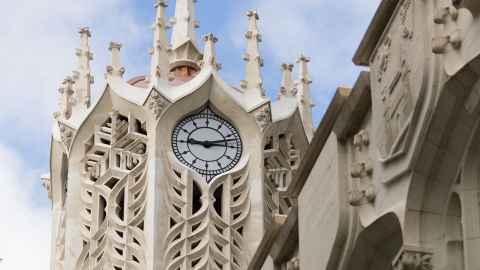Five stars: leading scientists win Royal Society medals
5 November 2025
Royal Society Te Apārangi awards highlight impact of world-leading research and science communication.

Five leading scientists from the University of Auckland have been recognised by Royal Society Te Apārangi for outstanding contributions to science, communication and society.
Their work spans social psychology, conservation and research leading to innovative medical treatments.
Professor Frank Bloomfield, Deputy Vice-Chancellor, Research and Innovation said, “These medals celebrate the world-leading contributions of our researchers and recognise the depth and breadth of research at Waipapa Taumata Rau, University of Auckland, research that has clear benefit for Aotearoa New Zealand.”

Professor Christian Hartinger (School of Chemical Sciences) was honoured with the Hector Medal for advancing understanding of how compounds called metal complexes interact with proteins – work that is helping design next-generation anticancer drugs.
His research bridges chemistry and biology to target specific proteins in cancer cells, reducing side effects and drug resistance. Hartinger says the award recognises years of collaboration with students and colleagues and an ambition to explore problems on a fundamental level.
“Scientific research is not a one-man show,” he says. “It requires many puzzle pieces to come together to paint a complete picture”. The Hector Medal recognises outstanding work which has advanced the chemical, physical, mathematical, or information sciences.

Professor Chris Sibley (School of Psychology) received the Durie Medal for his landmark New Zealand Attitudes and Values Study (NZAVS) – a 16-year project tracking the views of more than 70,000 New Zealanders.
The NZAVS provides vital insights into how social attitudes and wellbeing evolve over time, informing policy on discrimination, health, and societal cohesion. Sibley says the study offers “a window into our recent history and how people in our communities have changed over time”.
The award belongs to “the entire NZAVS research group,” he says. The medal is for New Zealand’s pre-eminent social scientist, recognising research that has had both national and international impact.

Professor Margaret Stanley (School of Biological Sciences) was awarded the Callaghan Medal for her outstanding contribution to communicating science and raising public awareness.
An ecologist passionate about translating research into real-world impact, she has become a trusted voice on biodiversity issues and invasive species.
Through media, workshops, and community engagement, she helps New Zealanders understand how small, local actions – such as choosing native plants and managing pets responsibly – can protect native ecosystems.
She is proud to see science communication recognised as a vital part of being a scientist.

Professor Rochelle Constantine (School of Biological Sciences) received the Fleming Medal for pioneering research that has shaped marine conservation policy in Aotearoa and internationally.
Her work on whales and dolphins has informed decisions to protect endangered species, including speed reductions in the Hauraki Gulf that have saved Bryde’s whales from fatal ship strikes. Constantine says the award honours the people and ocean animals she has worked with.
“The ocean is critical for a thriving planet,” she says. “We are ocean people – our ocean space is 14 times larger than our landmass, but we don’t value it like we should.” Her medal recognises distinction in the protection, maintenance, management, improvement, or understanding of the New Zealand environment.

Professor Leo Cheng (Auckland Bioengineering Institute) received the MacDiarmid Medal for outstanding scientific research that demonstrates the potential for application to human benefit.
Cheng has developed world-leading techniques to record and analyse electrical activity in the body, opening new frontiers for diagnosing and treating gut-motility disorders.
By combining mathematical modelling with experimental research, Cheng’s team has revealed how disordered electrical signals in the gut cause debilitating symptoms such as chronic nausea.
His research has informed the creation of new diagnostic biomarkers and therapies, including gastric electrical pacing. He acknowledged the hard work and contributions of students and colleagues and the support of friends and family, especially his wife – “this award is as much hers as it is mine”.
Media contact
Paul Panckhurst | Science media adviser
M: 022 032 8475
E: paul.panckhurst@auckland.ac.nz